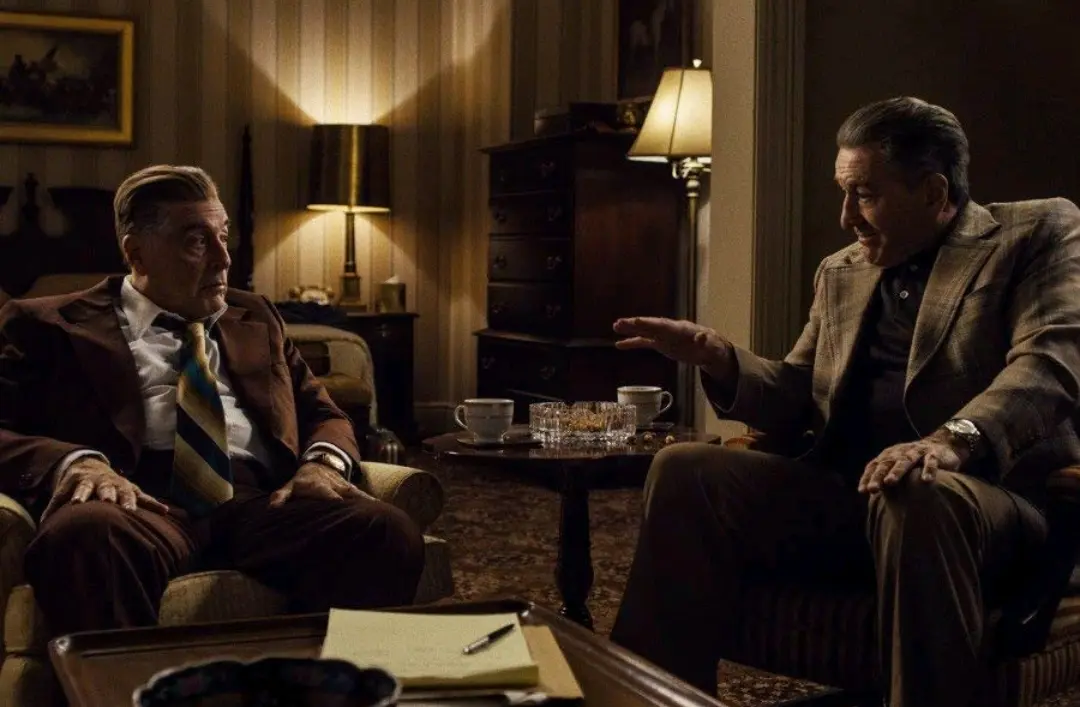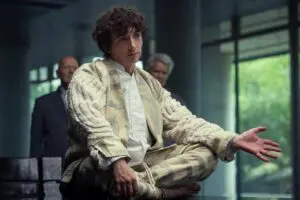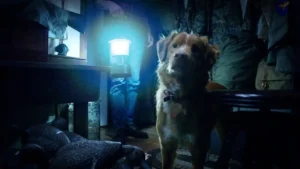Summary
The Irishman is Scorsese’s Gangster Epic: A big, grand, ambitious rags to riches mob tale that blurs the lines between loyalty, friendship, and business. It might be the quickest 209-minutes in the history of cinema. Joe Pesci, welcome back.
Martin Scorsese’s The Irishman is his gangster epic: a big, grand, ambitious rags to riches mob tale that blurs the lines between loyalty, friendship, family, and business set in the fabulous 1950s. It’s the post-war era, where everyone grabbed their girl and started a family that gave birth to the baby-boomer generation, who are currently sucking up all the social security they can find.
After the war, that’s all you wanted if you made it out alive, grabbing that American dream of a modest home, and a working-class job to put food on the table. That’s what happened with Frank Sheeran (Robert De Niro), an ex-veteran, a truck driver around the greater Philadelphia, Pennsylvania area. To make ends meet for his burgeoning family, gigantic slabs of meat begin to fall out of his truck into the hands of Felix “Skinny Razor” Di Tullio (Bobby Cannavale).
Fortunately, he is a teamster, and when caught, is fired from his job, but is represented by a union lawyer, Bill Bufalino (Ray Romano), who has a connection to Russell Bufalino (Joe Pesci, fresh out of retirement at age 75) and his Pennsylvania crime family. While moving up the ranks, from a truck driver to a hitman, to Bufalino’s right-hand man, he works with Jimmy Hoffa (yes, that Jimmy Hoffa), the powerful head of the Teamsters union, and a hero to working-class men and women everywhere.
It’s an almost pure genius how Scorsese solves (almost) any issues I’ve had with movies that incorporate flashback sequences. The solution was to use young actors who look nothing like the older character they will eventually turn into (the best I’ve ever seen was Tom Lipinski played a young Josh Brolin in Labor Day).
Alternatively, to make matters worse, you simply just change someone’s hairstyle, but they have been obvious crow’s feet (see Life Itself) or just cover up the only one in his regiment with all face paint (Tommy Lee Jones in Rules of Engagement). While the technology, essentially, allows you to relive your favorite actor’s glory days, effectively, I do have a reservation here about it when the actors attempt to emote.
There is a scene towards the beginning of the film, where De Niro, playing a 40-year-old version of himself, is walking, then looks from side to side; it made me feel like I was watching an app that places your friends and family’s heads on dancing elves. Other than that, it’s quite an achievement, making everything flow seamlessly, relatively distraction-free so it won’t take you out of the experience.

Image from ‘The Irishman’ (Credit – Netflix)
The film was adapted by Oscar-winning writer Steve Zaillian, who is a top scribe of choice of any big-time director’s list, from the nonfiction book I Heard You Paint Houses: Frank “The Irishman” Sheeran and Closing the Case on Jimmy Hoffa. I’ll admit that I didn’t know much about the film before I watched it.
When you have an event film of this nature, I like to avoid everything about it and was surprised how much it delves into the Jimmy Hoffa story. As the script notes, young people today may not know who he was, but he was a working-class rock star in his time, and his disappearance still ranks up there as one of the great mysteries in the history of this country.
I wonder how well this film will work for millennials since it’s investing heavily in the Hoffa lore. If you are a true-crime mystery buff, that story is intoxicating, with the film being shot so confidently, and performed with great assurance by its veteran cast, it may be the quickest 209-minutes in the history of cinema. That’s also a credit to the longtime Scorsese editor and collaborator Thelma Schoonmaker, who has edited all his films since Raging Bull.
The film has a quiet, stoic nature about it that has a pure, crisp Pennsylvania winter’s night running through its hot-blooded, Italian veins. With a cast that includes Robert De Niro, Al Pacino, Joe Pesci, Harvey Keitel, and a host of “shout them out if you spot them” actors from various HBO and Scorsese television projects (Boardwalk Empire’s Stephen Graham, in particular) that work so beautifully here together, and all egos are checked at the door.
The film is carried by De Niro, whose ice-cold stares are the perfect way to play off the film’s sneaky comic relief. It’s a performance that’s so understated and flawless you might not appreciate it at first. Pacino, for all the VFX technology, is still Pacino, and can’t possibly hide his face from going full John Pappas’s mode here (that’s a City Hall reference for anyone wondering).
For me though, the shots of Joe Pesci, who came out of retirement to be in the film, sitting and talking to De Niro brought back the days of great Scorsese collaborations from the ‘80s and ‘90s. It’s such a different role than you have ever seen him in, restrained, cold, but calculated, nowhere close to his memorable comedic roles that young cinephiles will remember him from in Home Alone and the Lethal Weapon series. It’s such a pleasure to see him on the screen again, and as much as I would hate to see him go back into retirement, this would be the perfect swan song.
The Irishman is about as complete and comprehensive a picture as you will ever see, from beginning to end. For all his work in the crime genre, from Mean Streets, Goodfellas, Gangs of New York, Casino, and The Departed, this film is as epic in scope as any he has ever done. It moves effortlessly. It’s like watching a Hall of Fame lineup who didn’t come back for the money but for the love of the game. There are no false notes, not a wasted frame, and the technology allowed Mr. Scorsese to prove, once and for all, you can go home again.



